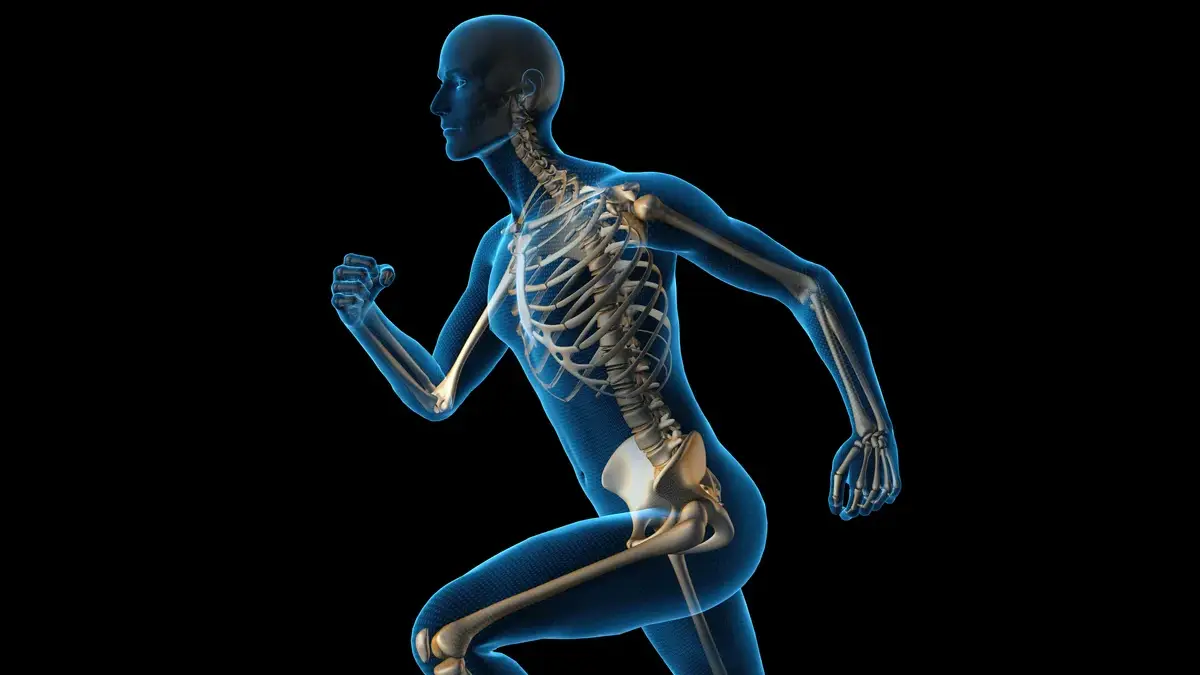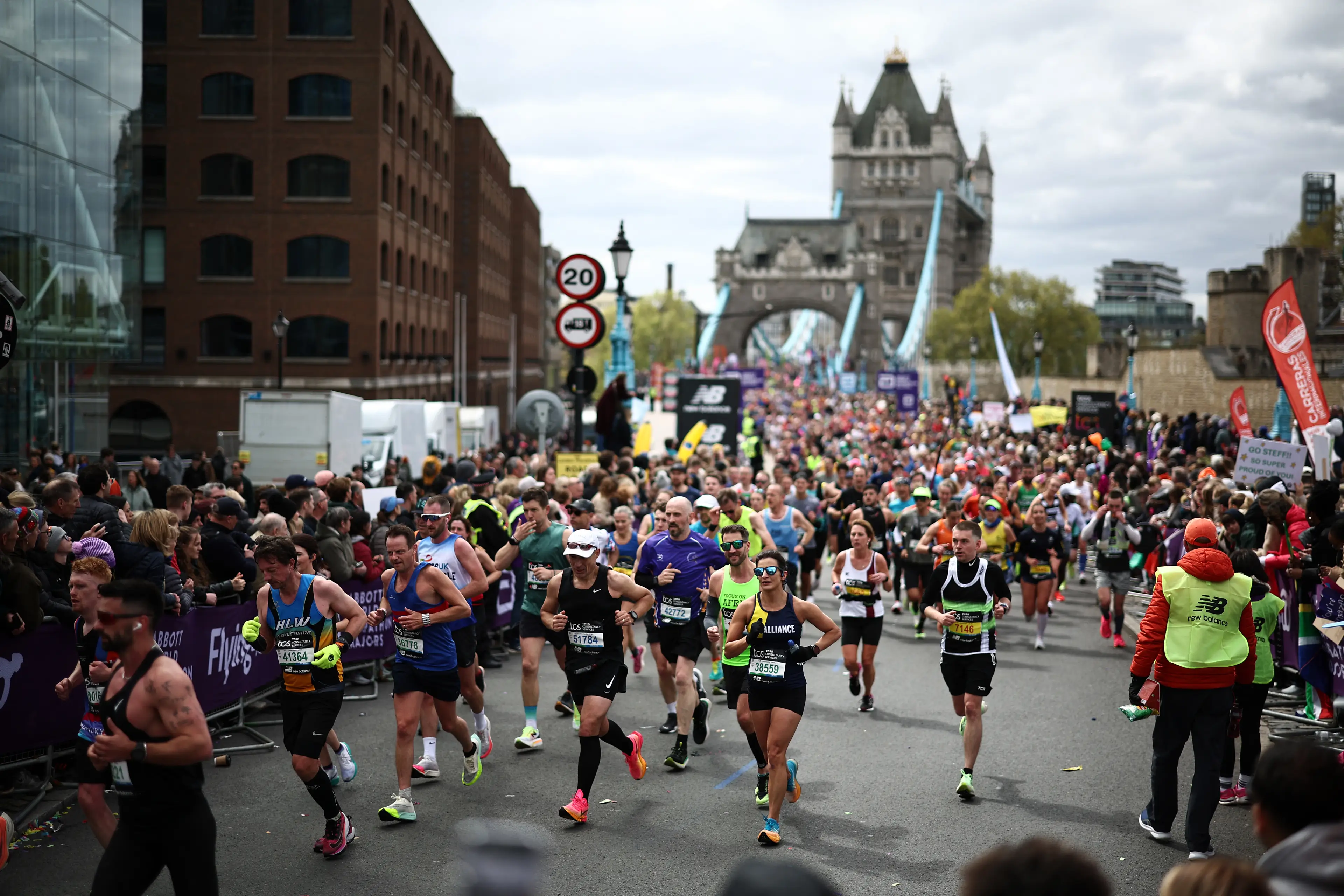
Marathons aren't for the faint-hearted, as running a whopping 26.2 miles is incredibly taxing on both your body and your mind.
Some people make it look easy, like that bloke who chain-smoked his way through the race in Guangzhou a few years back.
But the majority of participants freely admit that it's a gruelling experience which leaves them with a myriad of aches, pains and blisters.
Still, don't let that stuff put you off launching your running career - it's just better off to go into a marathon as prepared as possible, rather than replicating Simon Pegg in 2007's Run Fatboy Run.
Advert
More than 56,000 people are expected to pound the pavements in the UK capital this Sunday (27 April) when the London Marathon gets underway.
It kicks off at Greenwich Park and the exhausting 26.2 mile course comes to an end on The Mall after runners whizz past Buckingham Palace.
But what should the runners be bracing themselves for after crossing the finish line?
Well, according to Professor Alister Hart, the majority of people can barely walk after running their socks off for more than 26 miles.

The boffin, who is an orthopaedic surgeon at the Royal National Orthopaedic Hospital in London, explained that he found this out the hard way when he completed his first marathon 13 years ago.
"I couldn’t walk [properly] for two weeks afterwards," Professor Hart told iNews. "Everyone said, 'What do you expect? You can damage yourself'."
He explained that his personal experience made him even more curious about what state other people who ran marathons were left in, prompting him to conduct some research.
Aching muscles are part and parcel post-marathon, but the impact of running so many miles can be seen across all areas of your body.
Take your joints, for example - as Professor Hart discovered something quite intriguing after having an in-depth look at MRI scans of marathon runners before and after the race.
Signs of damage were present in the knees, hips and spines of the subjects before they had even began training, although none of them complained of any symptoms.
"It wasn’t a surprise that if you scan people in middle age, you’re going to find ‘damage’ in the knee," Professor Hart explained.
"What was a big surprise was the fact that this damage didn’t prevent them from training for a marathon and then running the marathon."

Even more interestingly, some of the runners' joints seemed to be in better nick after completing the 26.2 mile race - which he suspects might be down to the improved blood supply to the joints which all their hard work resulted in.
Another explanation for it could be that the participants had strengthened their bones through running, given that it's a weight-bearing exercise.
The study, which delved into the effects on the lumbar spine of marathon runners, found that eight of the 28 people had fluid in the bone marrow of the spinal vertebrae - which can be a sign of stress, trauma and inflammation.
After the marathon, there'd been a significant improvement in this in a couple of runners, with Professor Hart saying: "We know that bone health reduces as you get older, and one way to counteract that is by increasing loading."
He explained that people are advised to train for about four or five months ahead of a marathon, which is how long it takes for your body - including your muscles, joints and cardiovascular system - to adapt to running such long distances.
Marathons can also put a lot of pressure on your heart, which is why marathon runners who may be at higher risk of issue - such as smokers, those with a BMI over 28 or someone with a family history of heart problems - should get medical advice before training, according to the London Marathon’s medical director, Professor Sanjay Sharma.
But running is a great aid to boost your circulatory system, the cardiologist said, adding: "People who exercise regularly reduce their risk of a heart attack by around 50 percent in their 50s and 60."

Another thing which runners have to worry about is heat illness, or it's more severe sister, known as heatstroke.
It's forecast to be about 10C in London on Sunday when runners are setting off, but the mercury could rise up to 21C as people head into the final leg of the marathon, The Standard reports.
At the marathon this weekend, medics will have a load of devices on standby which look similar to body bags, and people who show signs of heat illness can be zipped up inside before the contraptions are filled with icy water.
Dr Todd Leckie, an anaesthetist at University Hospital Sussex who helped develop the treatment, said it can be difficult to persuade people to hop inside at first.
"Sometimes they can be quite combative and agitated, and you have to wrestle them into the bag," he joked. "It takes five or six people to initially manage the casualty.
"But once they’re in the bag, they often just accept it, and they’re in this ice-cold cocoon."
Speaking of the chance of heatstroke, he added: "Even if it happens to you, increasingly it will be treated very well and you’re unlikely to suffer any long term ill effects. The benefits of exercise far outweigh the tiny risks."
Happy running, folks!
Topics: Health, London Marathon, Science, UK News, Sport